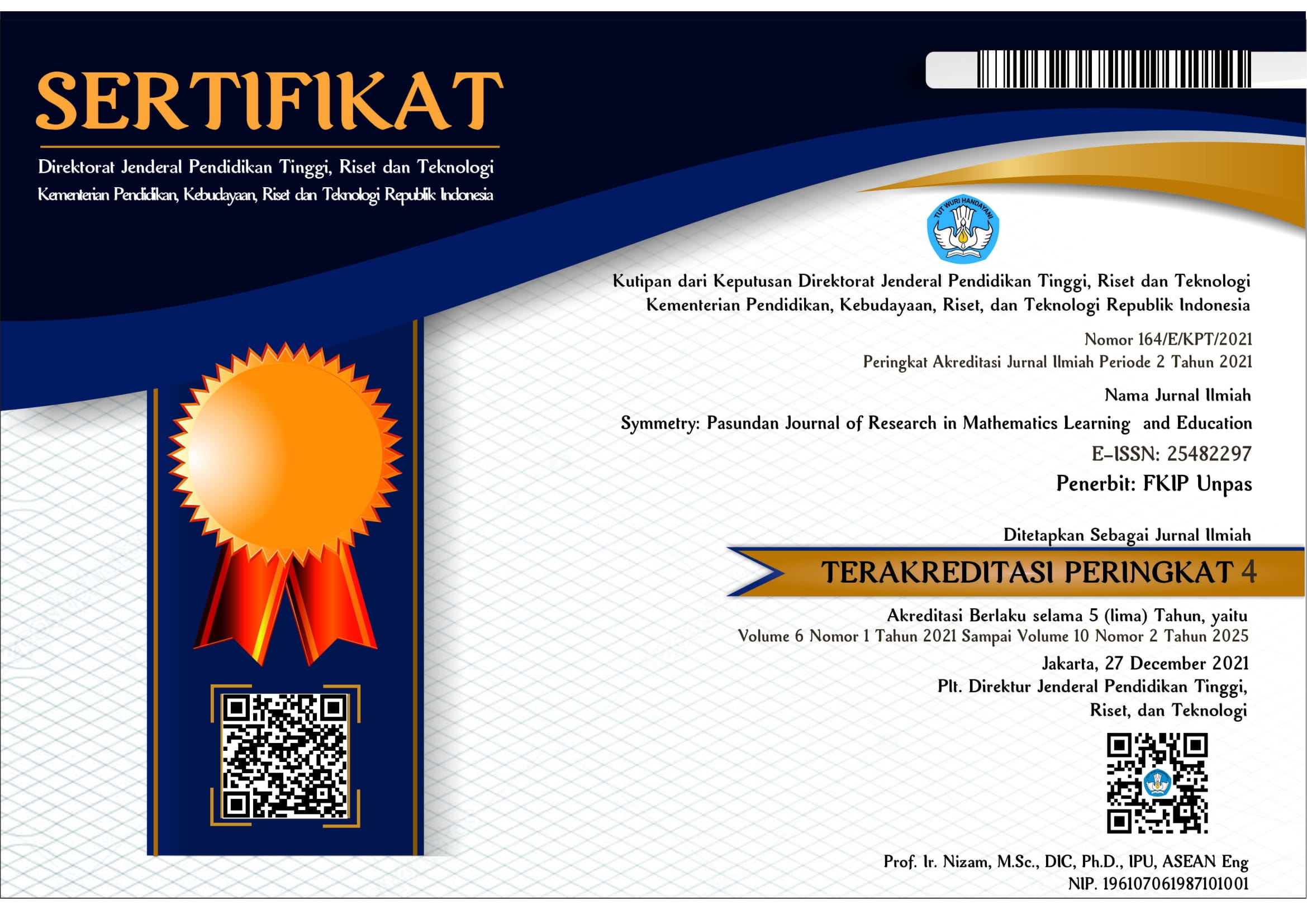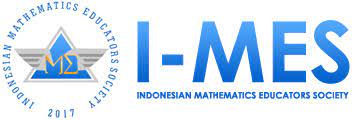Kemampuan Pemecahan Masalah Matematis Ditinjau dari Self Efficacy: Systematic Literature Review (SLR) di Indonesia
DOI:
https://doi.org/10.23969/symmetry.v7i2.6493Keywords:
Pemecahan Masalah, Self-Efficacy, Systematic Literature Review (SLR)Abstract
Mathematics education is very important for survival, therefore students are expected to have good mathematical abilities and attitudes, one of which is problem solving ability and self-efficacy. Solving ability problem Mathematics is one of the abilities that students must have in the 21st century. This study will examine the literature by using a systematic literature review related to how ability solving problem mathematical student self-efficacy reviewed. The literature criteria used in this research are in the form of journal articles indexed by Sinta, or Google Scholar with a maximum publication year of the last 5 years (201 8 -202 2 ). The purpose of this study is to identify, review, and draw conclusions from the literature relevant to how ability solving problem mathematical student reviewed self-efficacy in mathematics subjects. Based on the results of data analysis from the literature that became research data,
the level of ability solving problem mathematical different based on self efficacy student in mathematics. By doing this research can provide information related to how ability solving problem mathematical student reviewed self-efficacy and opportunities to conduct research related to ability solving problem mathematics and self-efficacy.
Downloads
References
Adetia, R., & Adirakasiwi, A. G. (2022). Kemampuan Pemecahan Masalah Matematis Ditinjau Dari Self Efficacy. Journal on education, 526-536.
Agustina, C. A., Rahayuningsih, S., & Ngatiman. (2018). ANALISIS KEYAKINAN DIRI (SELF EFFICACY) SISWA SMA DALAM MEMECAHKAN MASALAH MATEMATIKA DITINJAU DARI PERBEDAAN GENDER. Majamath, 103-116.
Bandura, A. (1997). Self-efficacy: the exercise of control. New York: Worth Publishers.
D.Juandi. (2021). Heterogeneity of problem-based learning outcomes for improving mathematical competence: A systematic literature review. Journal of Physics:Conference Serie.
Damianti, D., & Afriansyah, E. A. (2022). ANALISIS KEMAMPUAN PEMECAHAN MASALAH MATEMATIS DAN SELF-EFFICACY SISWA SMP. Jurnal Inovasi Pendidikan dan Pembelajaran Matematika, 21-30.
H.Hendriana. (2017). Hard skills dan soft skills matematik siswa. Bandung: Refika Aditama.
Hadi, S. (2019). Analisis Kesulitan Dan Self-Efficacy Siswa Ma Dalam Pemecahan Masalah Matematika. Jurnal Pendidikan Mandala, 1-4.
Hamimi, L., & Lasmita. (2019). Diagnosis kesalahan siswa dalam menyelesaikan sistem persamaan linear tiga variabel. Prosiding Seminar Nasional Multidisiplin Ilmu, (pp. 164-172).
Hendri, S., & Kenedi, A. K. (2018). Penegmbangan Perangkat Pembelajaran Matematika Berbasis Discovery Learning Untuk Meningkatkan Kemampuan Pemecahan Masalah Siswa Kelas VIII SMP. Jurnal Ilmu Pendidikan, 10-24.
Imaroh, A., Umah, U., & Asriningsih, T. M. (2021). ANALISIS KEMAMPUAN PEMECAHAN MASALAH MATEMATIKA DITINJAU DARI SELF-EFFICACY SISWAPADA MATERI SISTEM PERSAMAAN LINEAR TIGAVARIABEL. Jurnal Pembelajaran Matematika Inovatif, 843-856.
Indahsari, I. N., Situmorang, J. C., & Amelia, R. (2019). ANALISIS KEMAMPUAN PEMECAHAN MASALAH MATEMATIS DAN SELF EFFICACY SISWA MAN. Journal On Education, 256-264.
Jastisunda, M. (2017). Hubungan Self-Efficacy Siswa SMP dengan Kemampuan.
Juandi, D., & Tamur, M. (2020). Pengantar Analisis Meta. UPI PRESS.
Jusraa, H., & Ramadhania, N. (2022). Analisis Kemampuan Pemecahan Masalah Matematika Berdasarkan Self-Efficacy dan Gender. UNNES Journal of Mathematics Education, 125-136.
Lame, G. (2019). Systematic Literature Review: An introduction. Proceedings of the International Conference on Engineering Design, ICED, (pp. 1633-1642).
Liberati, A. (2009). The PRISMA statement for reporting systematic reviews and meta-analyses of studies that evaluate health careinterventions: explanation and elaboration. In Journal of clinical epidemiology.
Polya, G. (1985). How to solve it: a new aspect of mathematical methods. New Jersey: Pearson Education, Inc.
Rahmawati, A., Lukman, H. S., & Setiani, A. (2021). Analisis Kemampuan Pemecahan Masalah Matematis Ditinjau dari Tingkat Self-Efficac. JURNAL ILMIAH PENDIDIKAN MATEMATIKA, 79-90.
Resmiati, T., & Hamdan. (2018). ANALISIS KEMAMPUAN PEMECAHAN MASALAH MATEMATIS DAN SELF-EFFICACY SISWA SEKOLAH MENENGAH PERTAMA. Jurnal Pembelajaran Matematika Inovatif, 176-186.
Rosa, N. D. (2017). A Path Analysis Exploration of Teacher’s Effect, Self-Efficacy,Demographic Factors, and Attitudes toward Mathematics among College Students Attendings Minority Serving Institution in Face-to-Face and Hybrid Mathematics Courses. Florida International University.
Somawati. (2018). Peran efikasi diri (self-efficacy) terhadap kemampuan pemecahan masalah matematika. Jurnal Konseling Dan Pendidikan, 39-45.
Downloads
Published
Issue
Section
License
Copyright (c) 2022 Symmetry: Pasundan Journal of Research in Mathematics Learning and Education

This work is licensed under a Creative Commons Attribution 4.0 International License.
Hak Cipta sepenuhnya ditangan jurnal.




















